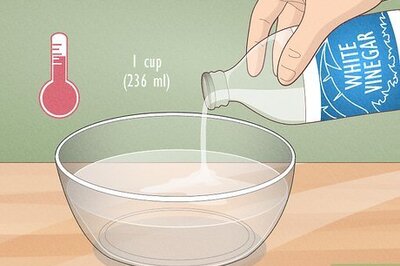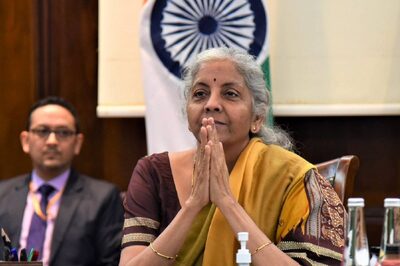
views
Moscow: In the first week of March, crowds of buyers line the narrow petal-covered lanes of Moscow's Rizhsky flower market.
Men from all over the Russian capital throng to the huge hall to buy flowers for female loved ones and colleagues to be offered on March 8, International Women's Day.
A legacy of the Soviet era, March 8 is widely celebrated and a public holiday in Russia.
The Russian Women's Day, which is in fact more about offering tulips and roses than women's rights, is the most profitable time of year for florists.
Raisa Khetagurova, 53, travels to Moscow from North Ossetia in Russia's Caucasus to sell flowers ahead of all of Russia's numerous state holidays.
She said no other holiday was as good for business as March 8, when vendors can earn up to "15 times" more than in a regular week.
Her bright yellow mimosa flowers come from Abkhazia, Georgia's separatist republic now under Russia's de facto control, while her tulips are from neighbouring Belarus.
For Khetagurova, buying flowers for women on March 8 is a sign of respect. "I'm very happy that women are so respected in Russia," she told AFP.
"Of course, men earn more (money). It's always been like that," she added.
"But I remember in Soviet times when they earned much more. Now times are changing." Rose seller Akbardzhon Kambarov — originally from ex-Soviet Tajikistan — said he has more than three times as many customers on Women's Day than on Valentine's Day.
But barely visible among the hundreds of tulips in her small stand, Crimean teenager Sayora Kurbanova said she disliked International Women's Day "because I have to work all the time".
The 18-year-old travelled with her parents from the Russian-annexed peninsula to Moscow for the holiday, which they prepare for up to three months in advance.
Only 30 percent of flowers on sale are grown domestically. The rest are imported, with around 60 percent coming from Ecuador and 20 percent from the Netherlands, according to Moscow city government's commerce department.
Ahead of March 8, flower prices leap and Moscow city authorities planned to pursue unlicensed flower vendors.
The municipal commerce department said this week that it would crack down on unlicensed sales ahead of International Women's Day.
"More than 360 people (officials) will take part in the raids," department head Alexei Nemeryuk told state media.
Authorities have also set up a hotline for Muscovites to report exorbitant prices, some of which leap by 20 percent from the previous year.
At Rizhsky market, the best customers were business owners and senior managers buying boxes of flowers for their female staff.
Valery Savelyev, 59, bought a bouquet of tulips for each of the 10 women who work at his furniture company.
"It's a tradition," he explained, before adding that he considered the holiday to be out-dated and "very Soviet". "It gives our men the chance to be good one day of the year," he joked.
In a country where sexism in the workplace is still rife, Women's Day is seen as a rare opportunity for Russian men to show a romantic side, and is celebrated in a similar way to Valentine's Day elsewhere.
Even officials wax lyrical about women, with President Vladimir Putin leading the way.
"We know that a woman's heart is the most loyal and that her forgiveness is the most precious thing," Putin told Russian women last year.



















Comments
0 comment